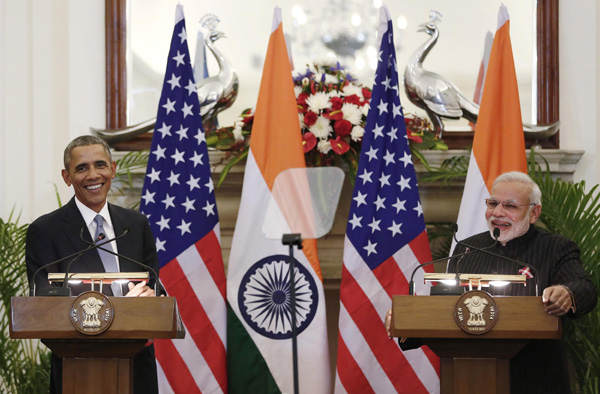Fallout of Obama's visit to India
Updated: 2015-01-28 07:35
(China Daily)
|
||||||||
 |
|
US President Barack Obama and Indian Prime Minister Narendra Modi (R) smile after giving their opening statement at Hyderabad House in New Delhi January 25, 2015. [Photo/Agencies] |
Editor's Note:
How will the US and India's cooperation ranging from nuclear to climate change impact China? Below are comments from Chinese and Indian experts:Sino-Indian ties focus on peace
US President Barack Obama's visit to India starting on Sunday has given rise to fresh speculations over his "pivot to Asia" policy, with a principal question being: Will the improving US-India ties be used to contain China?
The answer is "yes" and "no".
New Delhi does play a vital role in Washington's "pivot to Asia" policy given its strategic significance in South Asia and accelerating economic growth. And the agreements signed by Obama and Indian Prime Minister Narendra Modi during the past days do cover a wide area, including defense procurement and investment, civilian nuclear power, counterterrorism and climate change. But such cooperation is in the interest of both sides and is likely to further boost Washington-New Delhi relations and regional stability.
The fear of a rising China challenging its global dominance and breaking its alliances in the Asia-Pacific region prompted the Obama administration to launch the "pivot to Asia" policy in 2011. Seeking India's support could indeed serve the change in the US' strategy. But containing China is unlikely to be the goal Obama and Modi want to jointly pursue.
The trade between China and India may have been imbalanced and some border disputes may have occurred between them over the past few years, but the leaders of the two countries have carefully dealt with these problems.
With both parties pledging to control border disputes and pushing for the signing of 12 bilateral agreements worth $20 billion, President Xi Jinping, during his trip to India in September 2014, made it clear that China was determined to build a healthy and progressive relationship with India. The Indian leadership echoed the same determination, because it expected to increase Chinese investment in the country to improve its infrastructure and narrow the trade deficit with China.
In one word, cooperation rather than conflict remains the driving force of future China-India relationship.
Sun Shihai is director of Chinese Association for South Asian Studies. The article is an excerpt from his interview with China Daily's Cui Shoufeng.
- Global health entering new era: WHO chief
- Brazil's planning minister steps aside after recordings revelation
- Vietnam, US adopt joint statement on advancing comprehensive partnership
- European border closures 'inhumane': UN refugee agency
- Japan's foreign minister calls A-bombings extremely regrettable
- Fukushima impact unprecedented for oceans: US expert

 Stars of Lijiang River: Elderly brothers with white beards
Stars of Lijiang River: Elderly brothers with white beards
 Wealthy Chinese children paying money to learn British manners
Wealthy Chinese children paying money to learn British manners
 Military-style wedding: Fighter jets, grooms in dashing uniforms
Military-style wedding: Fighter jets, grooms in dashing uniforms
 Striking photos around the world: May 16 - May 22
Striking photos around the world: May 16 - May 22
 Robots help elderly in nursing home in east China
Robots help elderly in nursing home in east China
 Hanging in the air: Chongqing holds rescue drill
Hanging in the air: Chongqing holds rescue drill
 2.1-ton tofu finishes in two hours in central China
2.1-ton tofu finishes in two hours in central China
 Six things you may not know about Grain Buds
Six things you may not know about Grain Buds
Most Viewed
Editor's Picks

|

|

|

|

|

|
Today's Top News
Liang avoids jail in shooting death
China's finance minister addresses ratings downgrade
Duke alumni visit Chinese Embassy
Marriott unlikely to top Anbang offer for Starwood: Observers
Chinese biopharma debuts on Nasdaq
What ends Jeb Bush's White House hopes
Investigation for Nicolas's campaign
Will US-ASEAN meeting be good for region?
US Weekly

|

|







